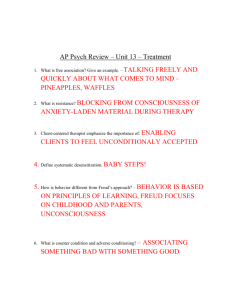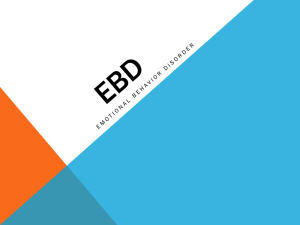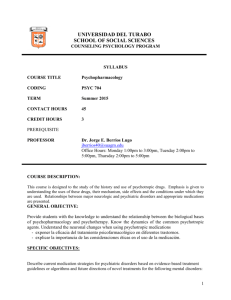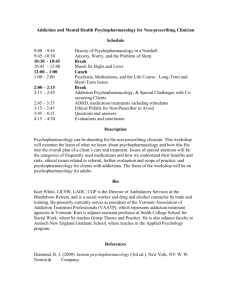Psychopharmacology PSY 6520 Text:
advertisement
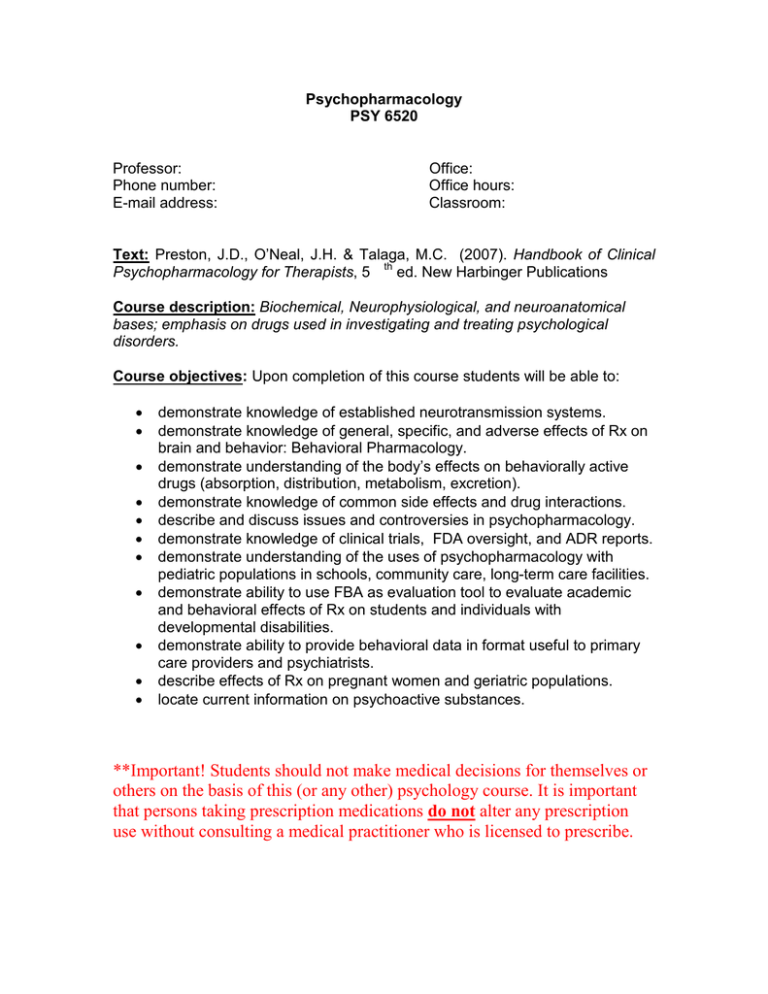
Psychopharmacology PSY 6520 Professor: Phone number: E-mail address: Office: Office hours: Classroom: Text: Preston, J.D., O’Neal, J.H. & Talaga, M.C. (2007). Handbook of Clinical Psychopharmacology for Therapists, 5 th ed. New Harbinger Publications Course description: Biochemical, Neurophysiological, and neuroanatomical bases; emphasis on drugs used in investigating and treating psychological disorders. Course objectives: Upon completion of this course students will be able to: • • • • • • • • • • • demonstrate knowledge of established neurotransmission systems. demonstrate knowledge of general, specific, and adverse effects of Rx on brain and behavior: Behavioral Pharmacology. demonstrate understanding of the body’s effects on behaviorally active drugs (absorption, distribution, metabolism, excretion). demonstrate knowledge of common side effects and drug interactions. describe and discuss issues and controversies in psychopharmacology. demonstrate knowledge of clinical trials, FDA oversight, and ADR reports. demonstrate understanding of the uses of psychopharmacology with pediatric populations in schools, community care, long-term care facilities. demonstrate ability to use FBA as evaluation tool to evaluate academic and behavioral effects of Rx on students and individuals with developmental disabilities. demonstrate ability to provide behavioral data in format useful to primary care providers and psychiatrists. describe effects of Rx on pregnant women and geriatric populations. locate current information on psychoactive substances. **Important! Students should not make medical decisions for themselves or others on the basis of this (or any other) psychology course. It is important that persons taking prescription medications do not alter any prescription use without consulting a medical practitioner who is licensed to prescribe. Course requirements/assignments color-coded by Method of Instruction: 1. Lectures/discussion/participation/small group work. Attendance expected at all classes. Additional readings will be provided in class. 2. Exams. Four in-class exams will cover material in the readings and lectures. Exams include multiple-choice and essay/short answer, making a possible total of 95 pts. for each exam (380 pts total for 4 exams). 3. Clinical Research Assignments (CRA*). Blue-highlighted semester sessions involve clinical research assignments based on the text and/or web sites. Each assignment is worth 10 pts. (80 pts total). All assignments will be word-processed and due at the next class period. 4. Semester Psychopharmacology Projects. Students will select a topic from among those suggested in class overview of the course and develop an online presentation with accompanying APA-style References list. Examples of possible format include text, images, power-point, question-and-answer, lab presentation. (40 pts.) Professional Counseling Program Dispositions. Students in the Professional Counseling Program are required to demonstrate program Dispositions (being collaborative, ethical, professional, reflective, self-directed, and critical-thinking students) in this class and in all other academic and professional endeavors. Information regarding demonstration of these dispositions may be communicated to program faculty to be used as a component of the faculty’s continuous evaluation of student progress. (See Professional Counseling Program Handbook for details.) Grading scale: 92 – 100% = A 64 – 73% = D 84 – 91% = B Below 64% = F 74 – 83% = C Accommodations for students with disabilities: If you have a documented disability as described by Section 504 of the Rehabilitation Act of 1973 and the Americans with Disabilities Act (ADA) and would like to request academic and/or physical accommodations, please contact John Harris, Director, Disabled Student Services (898-2783) as soon as possible. Course requirements will not be waived, but reasonable accommodations may be provided as appropriate. Class Schedule Date Content Areas: Chapter to cover Date Overview: Behavioral Pharmacology Ch 1/2 Date Neurobiology; Pharmacology Ch 3 Date Psychopharmacology Ch 4 Date Terms & Definitions Date Exam Date Diagnostic Considerations Ch 5 Date Depressive Disorders* Ch 6 Date Antidepressants Medications Ch 15 Date Bipolar Disorders* Ch 7 Date Bipolar Medications Ch 16 Date Exam Date Obsessive-Compulsive Disorders Ch 9 Date Anxiety Disorders* Ch 8 Date Antianxiety Medications Ch 17 Date Psychotic Disorders Ch 10 Date Spring Break Date Spring Break Date Antipsychotic Medications Date Exam Date Post-Traumatic Stress Disorder Ch 11 Date Psychotropic Rx Interactions; Medication Safety* C/G Ch 18 Date Borderline Personality Disorder Ch 12 Date Neuropsychology of Substance-Use Disorders* Date Substance-Related Disorders Ch 13 Date Miscellaneous Disorders* Ch 14 Date Herbs & Holistic Medicine Ch 19 Date When to re-evaluate* Date Pediatric Psychopharmacology Date Developmental Issues* Date Ethical Issues in Psychopharmacology Date Study Day Date Final Exam: Times Ch 21//D/E/G Ch 21
